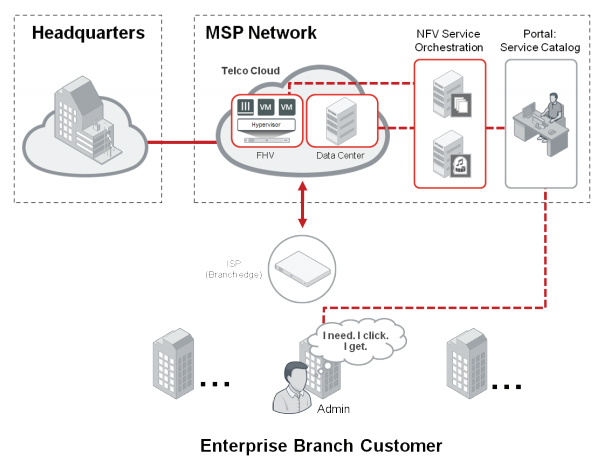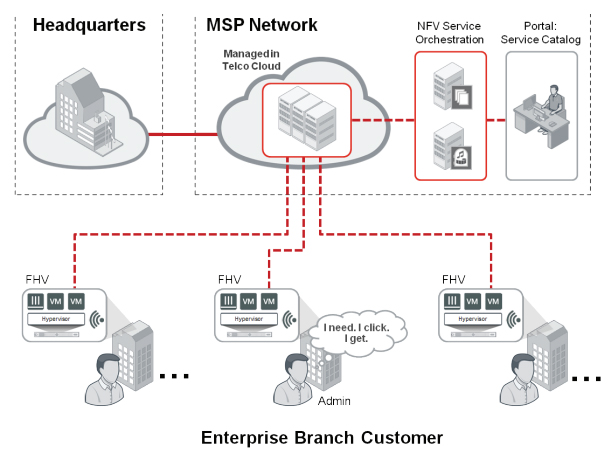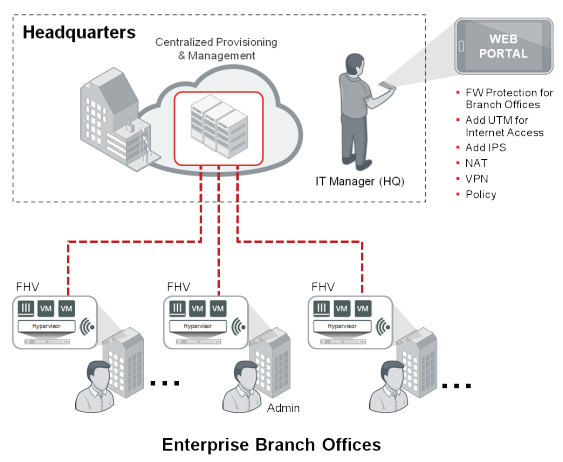Email: [email protected] Ligue agora! +55-11-3717-5537
Produto fora de linha
Enterprises need the flexibility to customize services according to their unique business needs and deploy new services quickly while keeping costs under control. Today’s traditional branch infrastructures with multiple dedicated CPE hardware make it challenging and costly to deploy custom services fast or bring a new branch online. Our hybrid virtual appliance simplifies and accelerates deployment of customized services on demand, with support for both universal CPE and cloud-based hosting models.
Today, the ability to quickly deploy new branch services is hampered by the complexity and costs involved in bringing a new branch office or service online. Managed service providers (MSPs) find it challenging to maintain and upgrade multiple on-premises equipment for their enterprise customers. The operational complexity of managing multiple on-premises equipment can cause significant delays in time to deploy and market new services, reducing profitability.
Enterprises need the flexibility to adapt their branch offices to their changing business needs in a secure and fast manner. They need the ability to turn up new services on demand from a single platform without the cost and complexity of deploying and managing additional devices, expertise which most branch personnel do not have.
Network Function Virtualization (NFV) enables MSPs to deploy network services as virtualized functions that are decoupled from hardware and chained together, eliminating the need for multiple dedicated CPE. NFV centralizes and automates key operational processes such as service creation and provisioning, accelerating service delivery. NFV also opens the door to upsell additional services to create differentiation. Cloud-based service orchestration via NFV platforms reduces on-site provisioning, lowers costs and accelerates service delivery.
FortiHypervisor is making the promise of rapid service delivery a reality for enterprises and MSPs. Built to deliver virtualized services as virtual network functions (VNFs), FortiHypervisor consolidates advanced networking and security services on a single device, eliminating the need for multiple CPE while enabling on-demand service delivery. Both a pure software instance for generic x86 platforms and a FortiGate hardware-based hybrid appliance are available.
A powerful Intel processor combined with FortiASIC hardware acceleration delivers the high security performance that customers have come to expect from Fortinet. Ample storage and memory produce excellent compute, network and security performance.
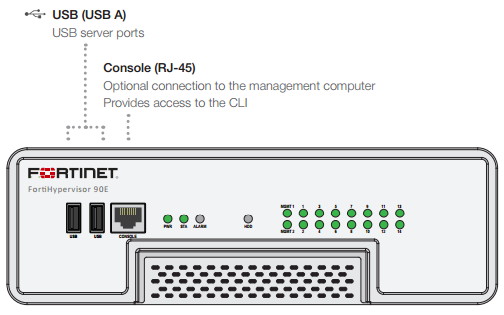
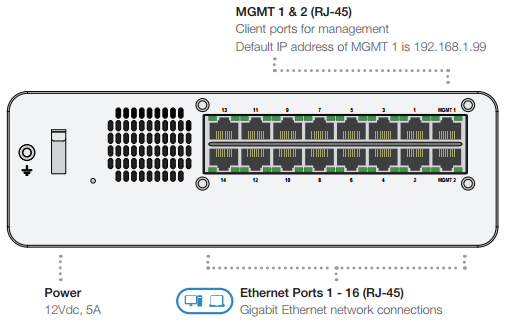
| FortiHypervisor 90E | FortiHypervisor 500D | FortiHypervisor 2500E | |
|---|---|---|---|
|
System Specifications |
|||
|
Maximum VMs Supported |
6 | 12 | 28 |
|
Compatitable VNFs/VMs* |
FortiManager KVM, FortiAnalyzer KVM, FortiGate KVM, FortiSandbox, FortiWeb KVM, FortiADC KVM, FortiRecorder KVM, FortiMail KVM, FortiVoiceEnterprise KVM, FortiCache 4.1.1 the cloud, Windows Server 2012 R2, Windows 10 Pro, Windows 7 Pro, CentOS 7, Ubuntu, Tiny Core Linux | ||
|
10/100/1000 Interfaces (Copper, RJ45) |
14 | 10 | 32 |
|
SFP Interfaces |
0 | 8 | 0 |
|
SFP+ Interfaces |
0 | 0 | 10 |
|
Management/HA Interfaces (RJ45) |
2 | 2 | 2 |
|
Included Trancievers |
0 | 2x SFP (SX 1 GE) | 2x SFP (SX 1 GE) |
|
Internal Storage |
1 x 1 TB Hard Disk Drive | 2 x 2 TB Hard Disk Drive | 2 x 3 TB Hard Disk Drive |
|
CPU Specification |
2 cores, 2 threads, 1.7 GHz | 4 cores, 4 threads, 3.2 GHz | 6 cores, 12 threads, 3.5 GHz |
|
Memory Size |
8 GB | 16 GB | 32 GB |
|
Dimensions |
|||
|
Height x Width x Length (inches) |
2.9 x 8.5 x 7.0 | 1.73 x 17.00 x 12.68 | 3.5 x 17.4 x 21.9 |
|
Height x Width x Length (mm) |
73 x 216 x 179 | 44 x 432 x 322 | 88 x 442 x 555 |
|
Weight |
4.7 lbs (2.1 kg) | 10.8 lbs (4.9 kg) | 36.5 lbs (16.6 kg) |
| Environment | |||
| Form Factor | Desktop | 1RU, Rack Mount | 2RU, Rack Mount, Ears supplied, Rail optional |
| Power Source | 100–240V AC, 60–50 Hz (External DC Power Adapter) |
100–240V AC, 50–60 Hz | 100–240V AC, 50–60 Hz |
| Current (Max) | 3A /110V, 1.5A / 220V | 4A /110V, 2A / 220V | 9A /110V, 4.5A / 220V |
| Power Consumption (Average / Maximum) | 30 W / 35 W | 113 W / 202 W | 312 W / 470 W |
| Heat Dissipation | 100 BTU/h | 690 BTU/h | 1604 BTU/h |
| Operating Temperature | 32–104°F (0–40°C) | 32–104°F (0–40°C) | 32–104°F (0–40°C) |
| Storage Temperature | -31–158°F (-35–75°C) | -31–158°F (-35–70°C) | -31–158°F (-35–70°C) |
| Humidity | 20–95% non-condensing | 5–95% non-condensing | 20–95% non-condensing |
| Redundant Power Supplies | — | Supports FRPS-100 | Dual Power Supply |
| System | |||
| Management | CLI (SSH, Telnet, Console), HTTP/S | CLI (SSH, Telnet, Console), HTTP/S | CLI (SSH, Telnet, Console), HTTP/S |
| Compliance | |||
| Safety Compliance | FCC Part 15 Class B, C-Tick, VCCI, CE, UL/cUL, CB | FCC Part 15 Class B, C-Tick, VCCI, CE, UL/cUL, CB | FCC Part 15 Class B, C-Tick, VCCI, CE, UL/cUL, CB |
The following table illustrates the performance of a single FortiGate VM04 running on the FortiHypervisor appliance.
| FortiHypervisor 90E | FortiHypervisor 500D | FortiHypervisor 2500E | |
|---|---|---|---|
| System Performance | |||
| Firewall Throughput (1518 / 512 / 64 byte UDP packets) | 820 / 240 / 43 Mbps | 16 / 16 / 9 Gbps | 132 / 131 / 37 Gbps |
| Firewall Throughput (Packets Per Second) | 64.5 Kpps | 13.5 Mpps | 55.5 Mpps |
| Firewall Latency (64 byte UDP packets) | 100 μs | 2.18 μs | 1.26 μs |
| Concurrent Sessions (TCP) | 3.3 Million | 3.8 Million | 17 Million |
| New Sessions/Second (TCP) | 9,500 | 56,000 | 192,000 |
| IPsec VPN Throughput (512 byte packets) | 70 Mbps | 14 Gbps | 88 Gbps |
| SSL-VPN Throughput | 60 Mbps | 750 Mbps | 2.2 Gbps |
| IPS Throughput (HTTP / Enterprise Mix) | 277 Mbps / TBC | 2.3 Gbps / 750 Mbps | 14.6 Gbps / TBC |
| SSL Inspection Throughput | 105 Mbps | 850 Mbps | 2.6 Gbps |
| Application Control | TBC | 770 Mbps | TBC |
| Threat Protection Throughput | TBC | 450 Mbps | TBC |
FortiADC offloads server-intensive SSL processing with support for 4096-bit keys, TCP connection management, data compression and HTTP request processing from servers. This speeds up response times, reduces load on the backend servers, allowing them to serve more users.
SSL Forward Proxy utilizes FortiADC’s high-capacity decryption and encryption to allow other devices, such as a FortiGate firewall, to easily inspect traffic for threats. An inline pair of FortiADCs at the front end and back end of a firewall remove all encryption so that the firewall isn’t taxed with the additional load of SSL processing. FortiADC ensures seamless re-encryption with certificates intact with no user disruptions.
FortiADC’s Transparent HTTP/S and TCP/S Mirroring Capabilities decrypt secure traffic for inspection and reporting. Copies of clear traffic can be sent for analysis by FortiGate or other third-party solutions for an indepth view of threats that may be hidden in encrypted traffic while FortiADC continues to perform its application delivery functions.
FortiADC integrates with Gemalto’s SafeNet Enterprise Hardware Security Modules (HSMs) to use the advanced security certificates managed by the HSM for the encryption and decryption of secure application traffic. This lets organizations that use Gemalto’s SafeNet HSMs deploy a high-performance ADC solution using a strong, centrally-managed set of certificates and encryption keys.
FortiADC’s included Global Server Load Balancing (GSLB) makes your network reliable and available by scaling applications across multiple data centers for disaster recovery or to improve application response times. Administrators can set up rules that direct traffic based on site availability, data center performance and network latency.
Built-in Link Load Balancing (LLB) gives you the option to connect your FortiADC to two or more WAN links to reduce the risk of outages or to add additional bandwidth to relieve traffic congestion. FortiADC supports inbound and outbound Link Load Balancing to manage traffic leaving or entering the device. Using policy routing, FortiADC can support complex NAT and routing requirements to address almost any network LLB architecture. With Tunnel Routing you get high-speed, reliable site-to-site connectivity without the need to lease expensive WAN links. It aggregates multiple links to create a virtual tunnel to a remote data center that ensures availability especially for applications that are time sensitive and require large single-session bandwidth such as video conferencing.
Reduce server overload, bandwidth saturation, high latency, and network performance issues with intelligent caching. FortiADC dynamically stores popular application content such as images, videos, HTML files and other file types to alleviate server resources and accelerate overall application performance.
Accelerate application performance and reduce overall bandwidth requirements with HTTP compression. FortiADC intelligently compresses HTTP and HTTPS traffic. By reducing server reply content size it accelerates performance and improves response times. FortiADC supports both industry standard GZIP and DEFLATE algorithms for many content types used by today’s latest web-based applications.
Managed service provider and enterprise data center administrators can divide a FortiADC into two or more virtual FortiADC devices, each operating as an independent application delivery controller. Each VDOM can provide completely separate ADC services, such as server load balancing, SSL offloading, and traffic routing policies. A multi-VDOM FortiADC can be centrally managed or can be assigned to a VDOM administrator to manage their own virtual ADC.
Web applications can be an easy target for hackers. FortiADC offers you multiple levels of protection to defend against attacks that target your applications. In addition to its stateful firewall feature, built in to every FortiADC is a Web Application Firewall that can detect known threats using FortiGuard WAF Security Services for layer 7 attack signatures (subscription required) and checks that requests haven’t been tampered with using its HTTP RFC compliance constraints. FortiGuard Web Filtering works with FortiADC’s SSL Forward Proxy feature to simplify the process of managing exceptions for secure traffic inspection. Instead of manually configuring single URLs, Web Filtering gives administrators the ability to choose websites by category type to enable or disable SSL traffic inspection as a group instead of on a site by site basis. FortiADC also supports our FortiGuard IP Reputation service (subscription required) that protects you from sources associated with DoS/ DDoS attacks, phishing schemes, spammers, malicious software and botnets.
FortiADC’s Lua-based scripting language gives you the flexibility to create custom, event-driven rules using predefined commands, variables and operators. Using easy-to-create scripts, you get the flexibility you need to extend your FortiADC with specialized business rules that give you almost unlimited possibilities for server load balancing and content rewriting to meet the needs of your organization.
FortiHypervisor is available as a hybrid CPE running on FortiGate hardware, and a virtual CPE software instance that can be deployed on any generic x86 platform. FortiHypervisor supports the following on-premises and cloud-hosted use cases.
